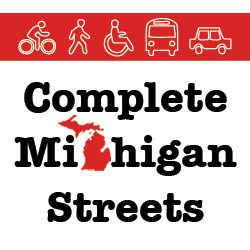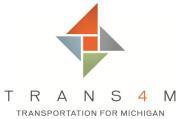You are currently browsing the category archive for the ‘Take Action’ category.
Michigan’s draft Complete Streets policy is out, and the Michigan State Transportation Commission (MSTC) is looking for your feedback. Through July 13th, we urge you to join other citizens around the state by signing the change.org petition asking MSTC to adopt a stronger policy.
MSTC, a six-member board that establishes the policy and plans for Michigan’s Department of Transportation (MDOT), recently released the draft policy for implementing Complete Streets on state roads. The Complete Streets policy will direct MDOT planners to design and maintain roadways that fit within the context of the community and keep all users in mind, including bicyclists, public transit riders, motorists, and pedestrians of all ages and abilities.
While the state’s effort is a big step in the right direction, bicycle, disability, transit, and pedestrian advocates around the state think the policy could be clearer, more specific, and include firm timelines for implementing Complete Streets procedures. Advocates analyzed the policy, comparing it to national best practices, and have identified a number of key areas where Michigan’s policy could be improved.
The draft policy is the result of Complete Streets legislation passed in 2010 with overwhelming support from Michigan Legislature and the public. The legislation requires that the state adopt a policy by August 2012. MSTC is only allowing two weeks for the public to review and comment on the policy and this period is quickly coming to a close on July 13th. That’s why we need you to ACT TODAY and sign the petition urging MSTC to make improvements to the policy before adopting it.
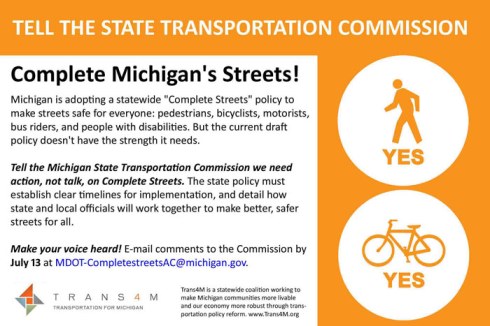 Michigan officials need your input on a draft policy that could make streets in your community much safer.
Michigan officials need your input on a draft policy that could make streets in your community much safer.
It’s Michigan’s official Complete Streets policy, and through July 13, you can join other citizens around the state to send a clear message to the state:
Adopt a policy that is strong and that moves Michigan forward.
Last week, the Michigan State Transportation Commission, a six-member board that establishes the policy and plans for Michigan’s transportation department, released a draft policy for implementing Complete Streets on state roads. The Complete Streets policy will direct Michigan Department of Transportation (MDOT) planners to design and maintain roadways that fit within the context of the community and keep all users in mind, including bicyclists, public transit riders, motorists, and pedestrians of all ages and abilities.
While the state’s effort is a step in the right direction, most bicycle, disability, bus, and pedestrian advocates around the state think the policy could be clearer, more specific, and include firm timelines for implementing Complete Streets procedures.
Without clarity and timelines most feel that the policy could become just another document that sits on a shelf in Lansing.
Michiganders have made it clear. They want safe and convenient transportation choices. And they want better, safer, and more Complete Streets.
To make sure Michigan adopts a strong policy, here’s how you can get involved:
Read the 2-page DRAFT Complete Streets policy here.
Please send an email to the Michigan State Transportation Commission and tell them how you feel about roads in your local community.
Here’s the email address: [email protected]
In your note, please tell them that you want a complete streets policy that:
- Establishes clear internal timelines and specific procedures that the Department, must adopt;
- Commit to training Department staff and other stakeholders on Complete Streets implementation, and;
- Directs state officials to use best practices while working with local officials and stakeholders on best practices to make better, safer streets for all.
Spread the word on Facebook:
Please “like” and “share” Trans4M’s Facebook postcard. Include the caption:
Michigan is adopting a Complete Streets policy and we think it can be better. Tell the Michigan State Transportation Commission that we need a stronger Complete Streets policy! http://bit.ly/MU9HJv
Let’s move Michigan forward!
Please “like” and “share”
To learn more about Complete Streets in Michigan, check out the Michigan Complete Streets Coalition website: http://michigancompletestreets.com
Let’s move together to complete Michigan’s streets!
 Transportation for Michigan wants to hear how your streets are being made complete! This summer the State Transportation Commission is creating a Complete Streets policy as required by Michigan’s PA 135. Share your story, good or bad, about how Complete Streets (or lack thereof) has impacted you personally, your community’s efforts to develop and implement Complete Street policy and projects, or how transportation planning for Complete Streets projects has worked in your community. Your stories will illustrate the importance of Complete Streets and implementing policies that create roads for all modes.
Transportation for Michigan wants to hear how your streets are being made complete! This summer the State Transportation Commission is creating a Complete Streets policy as required by Michigan’s PA 135. Share your story, good or bad, about how Complete Streets (or lack thereof) has impacted you personally, your community’s efforts to develop and implement Complete Street policy and projects, or how transportation planning for Complete Streets projects has worked in your community. Your stories will illustrate the importance of Complete Streets and implementing policies that create roads for all modes.
Please fill out the form here and submit your story today!
Stand up for Complete Streets and the preservation of non-motorized funding at the 2012 Lucinda Means Bicycle Advocacy Day on May 23rd.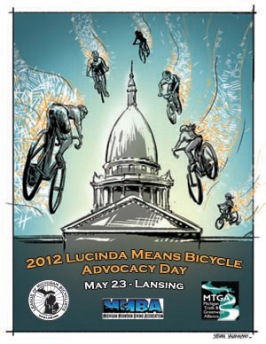
Bicyclists and Complete Streets supporters will meet with members of the Michigan Legislator on May 23rd at the State Capitol to advance legislative priorities aimed to make Michigan a more bicycle-friendly state. The event will be hosted by the League of Michigan Bicyclists, Michigan Trails and Greenways Alliance and Michigan Mountain Biking Association. All non-motorized transportation advocates are encouraged to participate.
Their Advocacy Agenda (PDF) includes a number of items such as establishing vulnerable roadway user designations for bicyclists, pedestrians and wheelchair users to create enhanced penalties for drivers who injure or kill a vulnerable roadway user. Advancing bikes-on-trains is another top priority. Roll-on bike service would allow cyclists to take bicycles on-board Michigan Amtrak trains, making multi-modal travel easier in Michigan. This would extend Complete Streets principles of connectivity further than a communities geographic boundaries by linking local bicycle networks and passenger rail service.
Also included in the Advocacy Day agenda are a few bills that are raising the eyebrows of Complete Streets advocates across the state. SB 921 (Ouiment) and HB 5304 (Jansen) were both recently introduced as part of Governor Snyder’s transportation funding reform proposals. Language in these bills, needlessly eliminates the Michigan Complete Streets Advisory Council (MCSAC). The Council, comprised of representatives from 18 statewide government and non-government stakeholder agencies, was created as a result of Public Act 135 of 2010. It is charged with providing education and advice to the State Transportation Commission (STC), county road commissions, municipalities, interest groups, and the public on the development, implementation, and coordination of Complete Streets policies.
To date, the MCSAC has focused its efforts solely on drafting recommendations for the STC regarding the statewide policy for MDOT. As a result, little guidance has been provided to local units of government across the state.
While Michigan leads the nation with the most adopted Complete Streets ordinances and resolutions (over 70 in total), many communities are still hesitant to advance Complete Streets until the MCSAC provides further recommendations. The MCSAC provides valuable oversight and guidance for the effective implementation of Complete Streets throughout the state. Dissolving the MCSAC will create an unfortunate void for communities seeking to make their roads and streets safer for all users. The collective expertise of MCSAC should continue to be utilized as MDOT and local communities work to implement the finalized policy.
Another bill of concern is HB 5303, which removes a funding requirement from Act 51 that obligates communities and road agencies to spend a minimum of 1% of their transportation funding on essential non-motorized transportation projects.
Worse yet, HB 5303 includes provisions that reward funding to road agencies based on the number of Vehicle Miles Traveled (VMT) under their jurisdiction. This creates disincentives for investments in alternative transportation options such public transit systems and bicycle networks.
The bill penalizes communities and road agencies for making systemic improvements like “road diets,” a popular technique that reduces the number of travel lanes on roads designed to carry more vehicle traffic than they do in reality. A common “road diet” improvement converts four-lane roads that have lower traffic volumes into two-lane roads that also include center turn lanes and additional safety features such as bike lanes, creating new transportation options without causing additional congestion.
You can learn more about these issues and register for the 2012 Lucinda Means Bicycle Advocacy Day at www.LMB.org/advocacyday.
Reposted from the League of Michigan Bicyclists

Currently in Michigan, bikes are not allowed on board Amtrak trains, nor as checked luggage. Urge Amtrak to allow bikes on Michigan trains. Click the image to sign the petition.
LMB is extremely pleased that the recently published Michigan State Rail Plan makes clear recommendations that bicycles need to be accommodated on Michigan passenger trains. LMB thanks the Michigan Department of Transportation for recognizing this need. We also thank all of our supporters who responded to our call to submit comments to the rail plan this past year.
We now are asking for your help again to ensure that these recommendations are acted on promptly. Please sign our petition urging Amtrak to implement roll-on bicycle service on all Michigan service routes as they have already done in other states.
Currently in Michigan, bikes are not allowed on board Amtrak trains, nor as checked luggage. On board accommodations for bicycles will make seamless multi-modal connections possible by allowing passengers to bicycle to train stations, ride the train, and then conveniently bicycle to their final destinations within the community.
Our state is home to a number of bicycle tours in or near Michigan communities serviced by Amtrak. By adding bike facilities on Amtrak trains, many Michigan communities could benefit from increased tourism spending, particularly from vacationing Chicago residents. Without options to bring bicycles on board, Michigan is losing out on significant travel-related spending generated by bicycle tourism. Commuters traveling within Michigan would also have additional transportation options.
We encourage everyone to sign the petition, but it is especially important for Amtrak to hear from individuals living or working in or around current stations locations in Albion, Ann Arbor, Bangor, Battle Creek, Birmingham, Dearborn, Detroit, Dowagiac, Durand, East Lansing, Flint, Grand Rapids, Holland, Jackson, Kalamazoo, Lapeer, New Buffalo, Niles, Pontiac, Port Huron, Royal Oak, and St. Joseph/Benton Harbor. [The petition has received over 2350 signatures since it was launched]
Please click here to add your name to the petition and please share the petition link over your networks. When you add your name to the petition please use the “Why This Is Important” option to help personalize the message.
For those on Facebook, we have also created a Facebook Event titled “Tell Amtrak to Allow Bikes on Trains - Sign the Petition” to help raise awareness around this issue.
We sincerely appreciate your support on this issue and hope that by spring we will all have the ability to bring bicycles on board passenger trains in our state.
Join Trans4M for an exciting day in Lansing meeting with our legislators!
Thursday, February 23, 9am-4pm
Transportation for Michigan (Trans4M) members and supporters will meet with legislators to educate them on the Regional Transit Authority (RTA) and other Trans4M priorities. Legislative background and talking points will be provided. The agenda includes:
- 9:00 am – Sign in, welcome briefing and plan for the day
- 10:00 am - Meetings with House members (pre-scheduled meetings or drop-by visits)
- Senate will be in session (you can also ask to talk to your Senator off the floor)
- 12 noon - Lunch with legislators - Lunch provided
- 1:00 pm - Meetings with Senators (pre-scheduled meetings or drop-by visits)
- House will be in session (you can ask to talk with your Rep off the floor)
- 3:00 pm - Brief wrap up meeting and reporting back
Specific locations at the capitol to be announced soon.
Three important things to do before attending:
- Make sure to RSVP at www.tinyurl.com/Trans4Mday so we know how many to expect and can coordinate legislative meetings.
- Make sure to note whether you want to ride on the bus from Southeast Michigan or whether you’d like to carpool.
- Work with other advocates from your area to schedule meetings with your legislators for while you’re in Lansing. (Contact [email protected] for a sample meeting request letter.)
- Join us for a preview conference call to learn more about the issues and prepare. This call is scheduled for Tuesday, Feb 21 from 6-7pm at 605-475-4850, code 636655#.
For more information, contact Allie or Tim at 517-487-9539.
Trans4M is a statewide coalition working to make Michigan communities more livable and our economy more robust through transportation policy reform. We envision a connected, convenient system linking more frequent, reliable and affordable passenger rail and public transit, as well as active transportation and complete streets. www.Trans4M.org
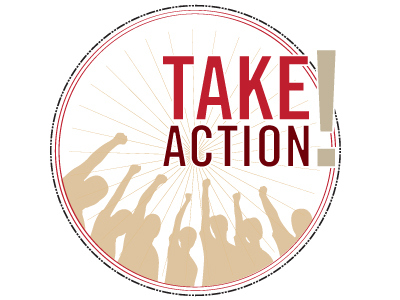 Killing Bicycle & Pedestrian Funding Won’t Fix Our Bridges
Killing Bicycle & Pedestrian Funding Won’t Fix Our Bridges
Contact Your Senators Today to Save Bicycle and Pedestrian Funding
Last month, we asked you to contact your U.S. Senators to oppose Oklahoma Senator Tom Coburn’s plan to strip funding from the Transportation Enhancements (TE) program, which is the main source of the federal investment for bike projects of all types. Bicycle advocates across the country generated more than 75,000 emails to Congress in 48 hours. This rapid and powerful grassroots response succeeded: Mr. Coburn withdrew his amendment and crucial funding for bicycling was preserved.
We are sorry to report today that walk/bike infrastructure funding is under serious and immediate attack again - this time in an amendment proposed by Senator Rand Paul (KY) that would redirect all funding for Transportation Enhancements to bridge repairs. Mr. Paul’s amendment is set for a vote on Tuesday, Nov. 1 when the Senate will finalize the transportation appropriations bill, setting funding levels for FY2012.
We need you to contact Senators Levin and Stabenow today and ask them to oppose this amendment. Here are four reasons why:
- Everyone deserves to be safe. We agree on the need to keep our bridges safe, but the lives of pedestrians and cyclists are important too. Thirteen people died when the Minneapolis bridge collapsed in 2007: since then, close to 20,000 pedestrians and 2,800 cyclists have died on our nation’s highways, largely as a result of poor highway design and a lack of safe non-motorized infrastructure – exactly what the enhancement program was created to fix.
- Reallocating walk/bike funding won’t make a dent in the cost of bridge repairs. If Sen. Paul’s amendment is successful, it would eliminate approximately $700 million in federal funding for FY2012 that is used to construct sidewalks, bike lanes, bike paths, trails and other infrastructure that makes it safe for bicyclists and pedestrians to get around. Even if every penny of these funds is diverted to bridge repairs, Senator Paul’s plan will still take 80 years to fix the backlog of bridge repairs we have today.
- Transportation Enhancements provide essential transportation benefits, like reducing road congestion, improving safety, getting people active, and creating more jobs per dollar than highway-only projects. Remember that the TE program represents less than two percent of the Federal transportation program and these projects help alleviate traffic congestion, improve safety, get people active, and create more jobs per dollar than highway-only projects.
- States don’t spend all the money they already receive for bridge repairs. Remember also that last year, states sent back to Washington $530 million of unspent bridge funds in rescissions – the states are leaving bridge repair funds on the table, unspent, year after year; they should at least spend these funds first.
If the Paul amendment succeeds, it will make it much more challenging to sustain funding for Transportation Enhancements, Safe Routes to School, and Recreational Trails in the long-term transportation bill that the Environment and Public Works Committee starts debating just 8 days later on November 9.
We must turn back any amendment to strip Transportation Enhancements.
Last month, more than 75,000 messages were sent to Senators to ask them to stand strong for Transportation Enhancements. That was an amazing turnout, but we must do better this time. Every time someone in Congress attacks bicycling and walking, we must push back even stronger than we did the time before. And, we will keep doing it until bicycle and pedestrian funding is protected.
This is the third time in a month that a small group of Senators have targeted Transportation Enhancements, using a different angle each time. It is a waste of the Senate’s time and taxpayers dollars to focus on this small and valuable program when we are in dire need of real and viable solutions to fix our failing transportation system.
Please contact your Senators today to ask them to vote against the Paul amendment (SA-821) to eliminate Transportation Enhancements. Then please forward this message to at least five others who care about the safety of people walking and bicycling on our streets.
Thank you for your help today, and for passing the call to action along.
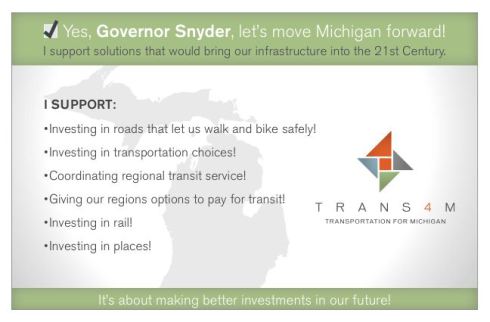 As you may know, Governor Snyder will be delivering his special address on Michigan infrastructure next week. LMB is pleased to be working with the Transportation for Michigan Coalition (Trans4m) is holding a week of action this week to help change the conversation to that of providing innovative transportation solutions to rebuild our cities and our economy.
As you may know, Governor Snyder will be delivering his special address on Michigan infrastructure next week. LMB is pleased to be working with the Transportation for Michigan Coalition (Trans4m) is holding a week of action this week to help change the conversation to that of providing innovative transportation solutions to rebuild our cities and our economy.
Tell Governor Snyder to move Michigan forward!
Week of Action: Help Transform Michigan’s Transportation Future
So far, most of the dialogue around Governor Snyder’s much awaited infrastructure plan has been about roads. While fixing our current transportation system is important, we need to acknowledge that strategic investment in rail, bus transit, and walking and biking through complete streets can help revitalize our cities and towns, reconnect people to jobs and opportunity, and reduce our transportation expenses.
Act now to tell Governor Snyder that you support solutions that will bring Michigan’s infrastructure into the 21st Century. There are easy ways you can tell the Governor that you want more than “business as usual” transportation planning and policy:
- Sign the online petition and pass it on via Facebook and Twitter
- Call Governor Snyder at (517) 373-3400
- Email Governor Snyder at [email protected]
- Visit the Transportation for Michigan Facebook Page
Ask Governor Snyder to consider the following solutions:
Invest in roads that let us walk and bike safely
Ensure the Michigan Department of Transportation adopts a statewide complete streets policy that is clear, comprehensive, and provides an effective framework for how state and local officials and citizens work together.
Invest in transportation choices
Allocate transportation funding strategically by investing in rail, public transit, and non-motorized options to build a 21st century multimodal transportation system.
Coordinate regional transit service
Establish a Regional Transit Authority that would coordinate and oversee regional public transit service in southeast Michigan. This would ensure greater efficiency and effectiveness for the region’s transit service.
Give regions options for pay for transit
Pass legislation that enables local communities and regions to choose from options to their fund their local transportation needs, with county or regional sales tax a top priority.
Invest in rail
Capitalize on the recent federal award by ensuring that our rail passenger rail infrastructure continues to expand and connect to cities and towns across the state.
These solutions will position Michigan for place-based economic development and result in vibrant places where people want to live and businesses want to locate.
Key Congressional leaders are attacking Safe Routes to School, Transportation Enhancements and Recreational Trails and are taking steps to cut off dedicated federal funding for walking and biking. Please act NOW!
We need every single person who simply wants safe options to walk or bicycle to contact their Senators and Representative today at this link sponsored by Safe Routes to School National Partnership! Just click here, and put in your zip code and the names of your congressional delegates will appear with a message you can send to them. It’s that easy to act to protect dedicated funding for biking and walking.
Read on for more information:
House Transportation Chairman John Mica (R-FL) announced yesterday that his transportation bill will eliminate dedicated funding for bicycling and walking, including Transportation Enhancements, Safe Routes to School and the Recreational Trails Program, and discourage states from choosing to spend their dollars on these activities that are “not in the federal interest.” Chairman Mica’s statement that these programs remain “eligible” for funding is worthless; without dedicated funding for these three programs, they are effectively eliminated.
Things on the Senate side are not much better. Senator James Inhofe (R-OK), the lead Republican negotiator on the transportation bill, declared that one of his TOP THREE priorities for the transportation bill is to eliminate ‘frivolous spending for bike trails.’ This is in direct conflict with Senator Barbara Boxer’s (D-CA) commitment to maintain dedicated funding for biking and walking. However, the Senate is working towards a bi-partisan solution, and Senator Inhofe’s comments mean funding for bicycle and pedestrian programs is at risk of total elimination.
Help protect Transportation Enhancements, Safe Routes to School and Recreational Trails. Contact your Members of Congress and tell them to reach out to Senators Inhofe, Boxer, and Congressman Mica to urge them to continue dedicated funding for these important bicycling and walking programs.
Do you need some good facts to further bolster your argument?
Not in the federal interest? Biking and walking make up 12 percent of all trips in the US, even as funding for biking and walking projects only accounts for 1.5% of the federal transportation budget. That is more than 4 billion bicycle trips and 40 billion walking trips a year, including trips to work, school, shopping and for recreation and tourism.
Frivolous? Two-thirds of all pedestrian deaths are on federally funded highways. One-third of children’s traffic deaths happen when children are walking or bicycling and are struck by cars. Bicycling and walking programs build sidewalks, crosswalks and bikeways-improving accessibility and saving lives.
The Facts
- Biking and walking are important forms of transportation, and funding for bicycle and pedestrian improvements is a very efficient use of federal transportation dollars. Portland, OR built 300 miles of bike lanes and trails for the cost of one mile of highway.
- These projects create jobs and build local economies. Building bicycle and pedestrian infrastructure creates 46% more jobs than building road-only projects per million dollars spent. Cities that invest in bicycle and pedestrian projects turn downtowns into destinations, and capitalize on increased business activity.
- Eliminating the 1.5% of transportation funding spent on bike/ped would have no meaningful impact on the federal budget, but would decrease transportation options for American families in a time of rising gas prices and an uncertain economy.
Why Act Now? Both the House and Senate long-term transportation bills are being written as we speak. We still have a chance of influencing the outcomes. Let’s make sure that funding for biking and walking programs don’t disappear for many years.
We need every Senator to tell Senators Boxer and Inhofe that bicycling and walking are vital parts of our transportation system, and that there must be dedicated funding for sidewalks, bike lanes and trails to ensure that bicyclists and pedestrians are safe. And we need every Representative in the House to tell Chairman Mica the same.
Please contact your Senators and Representatives TODAY to tell them that bicycling and walking are a critical part of a safe and equitable transportation system. Ask them to tell Representative Mica and Senators Boxer and Inhofe that a federal transportation bill must continue dedicated funding for bicycling and walking.
 As a follow-up to the Action Alert we posted in late April regarding the Michigan budget process, we wanted to update our supporters on the finalized budget in regards to complete streets and public transit funding.
As a follow-up to the Action Alert we posted in late April regarding the Michigan budget process, we wanted to update our supporters on the finalized budget in regards to complete streets and public transit funding.
The House version of the budget ultimately reduced bus operating and bus capital by $20 million, however the final version that came out of conference committee restored funding for public transportation to current year levels. We are extremely pleased to see that the House and Senate came together to recognize the vital importance of funding public transportation in Michigan.
The complete streets boilerplate language did not fare so well, however. Unfortunately, while the Senate version of the budget included the complete streets boilerplate language, which gave Transportation Enhancement (TE) funding preference to communities with complete streets policies, the final version lacked such language.
The TE program is a competitive grant program that funds projects such as nonmotorized paths, streetscapes, and historic preservation of transportation facilities, that enhance Michigan’s intermodal transportation system and improve the quality of life for Michigan citizens.
The TE incentive language, which was successfully included in last year’s budget, helped encourage over 25 communities in Michigan to adopt complete streets resolutions and ordinances in the past year alone. We are extremely disappointed that this incentive language, which did not cost anything, was removed from the bill.
We are pleased to report, however, that the Michigan Department of Transportation (MDOT), who administers TE funding, has verbally indicated that they will continue to give TE priority to communities with complete streets ordinances and resolutions despite this language being stripped out of the budget bill.
Having received numerous inquires regarding the subject of TE priority going to communities with complete streets policies; we recently requested further clarification from MDOT about how they implement this preference. The Department has explained to us that basically all things being equal in the applications between two communities applying for TE dollars, a community that has shown a true commitment to complete streets would have the more competitive TE project.
This does beg the question of how often communities actually submit truly identical applications. MDOT went on to explain that a community with a competitive project, a complete streets resolution, policy, or ordinance, and a robust public input process that engages all users of the system will have a better chance to secure TE funding than a community that does not develop projects on a good complete streets foundation. “There is no guarantee of funds, but complete streets is good for the community and it improves your chances for a successful application,” said Amber Thelen, MDOT’s TE Program Manager.
MDOT’s Project Competitiveness Details document, available on the TE Program website, specifically references complete streets in two places under the heading “What other factors make a project competitive for TE funding?”:
- project identified as a result of a community’s Complete Streets stakeholder involvement Process
- projects supporting a community’s Complete Streets policy, or is part of a statewide initiative such as Cool Cities, Cities of Promise, the Safe Routes to School Program, Heritage Route or Scenic Byways Program
They stressed that regardless if a community has passed a resolution or ordinance, their primary concern is whether or not the community can demonstrate a true commitment to the principles of complete streets in how they approach transportation projects. In addition, MDOT encouraged communities with questions or who have a potential project idea, to contact a TE Grant Coordinator who are available to assist communities by providing more information on the program, guidance on competitive projects, and how to best develop a competitive application. Contact information is available www.michigan.gov/tea, under the “Contact Us” heading.
We will continue to share further details on this topic as they become available.
We would again like to thank all of our supporters who contacted their legislator to ask them to protect transit funding and the complete streets boilerplate language.

